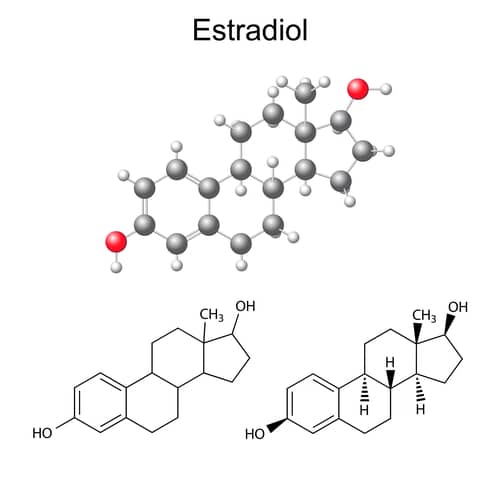What Does Estradiol Do?
What does estradiol do? First, let’s talk about the role of hormones in the body.

Your body runs on hormones — or maybe it would be more precise to say, hormones make your body run the way it’s supposed to.
Hormones are chemicals in your body that your body uses to communicate with itself. Your body is incredibly complex — it’s made up of a variety of cells, tissues, organs, and organ systems.
For all of these complex systems to work together in a coordinated fashion, they need to talk to each other.
That’s the role of hormones — they’re messengers of sorts, chemicals that one part of your body uses to speak to another part.
Take a complex process like growth. Growing from a baby into a toddler involves many different changes to many different tissues, organs, and organ systems. They all need to be coordinated, or disaster could result.
So, What Does Estradiol Do? First, Imagine What Would Happen to Your Body if Your Hormones Weren’t There to Coordinate Processes
Imagine if your right arm grew to its adult size in 1 year, but your left arm took 16 years to do the same. Imagine if your brain started growing at a faster rate than your skull. Imagine if your body began puberty when you were only 4 years old. Imagine of none of these processes were timed correctly, or if only parts of your body participated.
All of these situations result in disaster, at least, as far as your body is concerned. Complex processes like growth and development need to take place at the correct time, with tissues, organs, and organ systems communicating throughout.
Hormones make sure that happens.
Estradiol is just another messenger. So is testosterone, and progesterone too.
And because your body is smart, it’s rather conservative with its hormones. Rather than developing millions of different hormones, it uses many of the same hormones over and over for a variety of tasks.
That’s why having low hormones can be so detrimental — because it’s not just one process, or tissue, or organ, or system, that’s affected.
Your entire body can, and will, suffer.
What Does Estradiol Do? Depends on Your Sex
Now, while both men and women have estradiol in their bodies, the effects of the hormone vary significantly between the sexes.
For many years, scientists and researchers only had a very rough idea of what these hormones were actually doing in the body. We just weren’t aware of all the different processes in which hormones were involved.
Now we know better, but in the beginning, it seemed that these hormones were mostly involved in puberty, sexual determination, and sexual function.
For women, estradiol is involved in these different functions:
- Reproductive organ growth
- Ovulation
- Maintenance of eggs
- Development of secondary sexual characteristics
- Pregnancy maintenance and possibly labor initiation
- Bone and joint growth and maintenance
Additionally, estradiol may play an important role in both coronary health and brain health.
As far as men are concerned, one study indicates that estradiol is involved in several processes in your body, including:
- Libido
- Brain functions
- Lipid and skin metabolism
- Bone growth and resorption regulation
For many of the processes listed above, we only know a small amount about how the hormone is actually involved. We still have a great deal to learn, but we’ve come a long way.
So, what does estradiol do? No matter your sex, it plays a critical role in keeping you healthy.
And having low estradiol can be detrimental.
Click the button to learn more about low estradiol in men.
